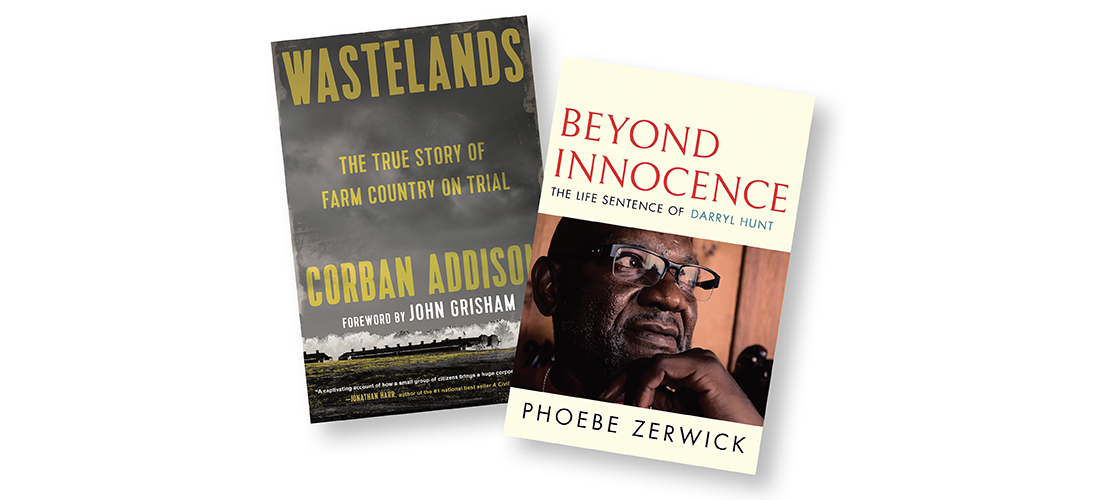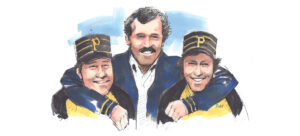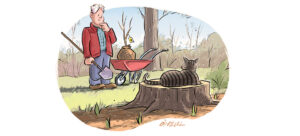
Of Race and Justice
Two books with common cause
By Anne Blythe
Sometimes two books can sit far apart on the bookshelf and seem to have little in common. Then you read them and discover the themes they share.
Wastelands: The True Story of Farm Country on Trial is novelist and lawyer Corban Addison’s first work of nonfiction, a fast-paced legal thriller that reads like a novel about — wait for it — hog feces.
Addison tells the saga of Elsie Herring and hundreds of other residents in eastern North Carolina so disgusted by the stench and waste disposal practices of the industrial-style hog farms among their rural, mostly Black communities that they waged a legal battle against a pork industry giant. Through deft description of courtroom drama and artful portraits of the characters in this classic good-versus-evil narrative, Addison exposes the longstanding injustices of institutional environmental racism.
In Beyond Innocence: The Life Sentence of Darryl Hunt, Phoebe Zerwick, head of the Wake Forest University journalism program who used to work at the Winston-Salem Journal, delivers a thorough journalistic exploration of the life, wrongful conviction, exoneration and death by the suicide of Darryl Hunt. Zerwick shines a harsh light on a fundamentally flawed justice system and the institutional racism embedded in it.
Addison opens his book inside the federal courtroom in Raleigh where U.S. District Judge W. Earl Britt has just been alerted that a jury has reached a verdict in one of a series of nuisance cases that hog farm neighbors brought against Smithfield Foods Inc., the world’s largest pork producer.
The decision came quickly.
“The word spread like sparks from a brushfire,” Addison writes. “Smartphones emerge from pockets and handbags, thumbs fly across screens, and messages are cast across the digital wind, lighting up other phones with chimes and beeps miles away.”
Britt, Addison writes, is “a charming octogenarian with the oracular eyes of a barn owl,” who waits for the assembly of the necessary attorneys, paralegals, plaintiffs and others to take their places in the courtroom. Peering over his glasses at the lawyers, he motions to the bailiff to bring in the jury.
A quiet settles over the courtroom. The foreman, holding an envelope with the verdict sealed inside, tells the judge that he and his fellow jurors have come to a unanimous decision. “As the envelope makes its short trip to the bench, the plaintiffs in the gallery take a breath and hold it,” Addison writes.
His prose is poetic though, at times, a bit overwrought. “The pain and sorrow of memory, together with the labor of years and dreams of days yet to come, are at the altar before them. Contrary to the tale of greed and opportunism being spun by politicians and poohbahs across town, they aren’t thinking about a million dollar payday as they wait for the judgment to be delivered. Instead, they are whispering a simple prayer, the prayer of verdict day, of verdictum. Please, Lord, let them believe us. Let them believe that we told the truth.”
In the ensuing scenes he gives readers a sense of history about land in the coastal plain that has been passed down from generation to generation among Black families who are standing up against the nemesis they say is responsible for them being unable to enjoy the life they, and their ancestors, once had.
This thoroughly researched and reported narrative ends with a visit to Joyce Messick, one of the plaintiffs in the nuisance cases who saw the hog farm near her family’s property shutter.
While Messick told him she finally felt as if she could breathe clean air, others have not gotten to that point. “Most have yet to see the change, to fill their lungs with liberated air, to stand upon emancipated ground,” Addison writes. “The dollar is still the lodestar of Smithfield Foods, and the legislature is still its domain.” Nonetheless, Addison concludes, there are people who will be relentless until commitments by the pork industry are realized.
To open her book about Hunt, Zerwick explains why she felt compelled to revisit a case she had chronicled in a series for the Winston-Salem Journal, one that led to new court proceedings that resulted in his exoneration.
“Beyond Innocence is my attempt to finish a story I began long ago,” she writes. “In 2003, when I wrote about the wrongful conviction of Darryl Hunt for the Winston-Salem Journal, Hunt was in prison then for the 1984 murder of a newspaper editor who had been raped and stabbed to death, not far from the newsroom where I worked.”
Hunt, who maintained his innocence throughout, was exonerated after 19 years of legal battles and the help of tireless advocates who refused to let the wrongful conviction stand.
“To the outside world, Hunt was the man who walked out of prison without rancor or regret,” Zerwick writes. “But the past haunted him, and the heroic narrative of a man who fought for justice masked a deep despair.” Zerwick decided to revisit Hunt’s story after he was found dead in the driver’s seat of a pickup truck that had been parked by a busy road with what appeared to be a self-inflicted gunshot wound.
She was grief-stricken, as were many others. Then she went into reporter mode.
“I wasn’t done with the story after all,” Zerwick writes. “I started looking into his death soon after the funeral. Rather than tackle the big question about the failure of the justice system, I focused first on the facts.” Answers began to arrive as she interviewed the people around him, studied photographs and Facebooks posts, and pored over correspondence Hunt had with his lawyers.
“Hunt’s death taught me a great deal about the limits of journalism and forced me to question my motives,” Zerwick writes. “Does the public’s right to know, that righteous principle we journalists invoke, justify exposing the secrets I hoped to find? Does shining a light in the dark places really help, as we claim it does? Who am I to tell a story Hunt had not told himself?”
In the end, though, Zerwick brings new layers to the saga of Darryl Hunt, the heroic advocate for reform, and the often-told recounting of his wrongful conviction.
“Long before politicians began campaigning against mass incarceration, Hunt saw the system he had left behind for what it is, a trap that condemns millions of men and women, and their children, to living on the fringes, barred from jobs, housing, bank loans, food assistance and more, barred, in short, from a reasonable chance at a decent life,” Zerwick concludes, and she wishes Hunt was here to be a part of the reforms.
Both Zerwick and Addison have crafted new, nonfiction accounts of old cases that tested the justice of the justice system. They should be read from cover to cover. PS
Anne Blythe has been a reporter in North Carolina for more than three decades.





